|
Dear Colleagues,
I am pleased to include another issue of RFS Briefings with some timely and encouraging updates on women in science.
Please continue to share important news and opportunities with us so that we may share it with you, and others who are committed to supporting the careers of exceptional women in science.
Stay safe and sound,
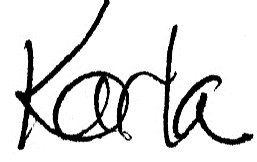
Karla Shepard Rubinger
Executive Director
Rosalind Franklin Society
www.rosalindfranklinsociety.org

House science committee chair leaves bipartisan legacy as she bids farewell.
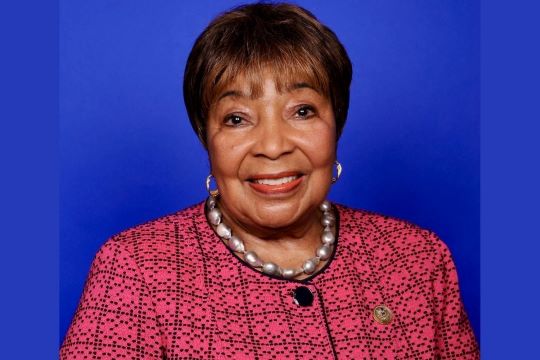 U.S. Rep. Eddie Bernice Johnson (TX) Credit: Wikipedia. U.S. Rep. Eddie Bernice Johnson (TX) Credit: Wikipedia.
Representative Eddie Bernice Johnson (D–TX) recently announced she would not seek a 16th 2-year term next fall, making her the 16th House Democrat to announce their departure in this election cycle. “Johnson is the first Black woman to chair the committee. Over the past 3 years she has teamed with the panel’s top Republican, Representative Frank Lucas (OK), to stake out a centrist position on a host of challenges facing the U.S. scientific community, from China’s growing scientific prowess to research misconduct,” writes Jeffrey Mervis. Read more.
The gene-synthesis revolution.
Researchers can now design and mass-produce genetic material — a technique that helped build the mRNA vaccines. What could it give us next? These fabulous female founders at Twist Bioscience and Ginkgo Bioworks were speakers at the RFS meeting last winter! Read more. Watch Emily Leproust’s RFS presentation here and Reshma Shetty’s presentation here.
There’s a lot of financial aid available to women pursuing STEM careers.
“Having access to scholarships can help to alleviate some of the burden that women face today, and it is vital to them receiving an education that will get them the same seat at a table as their fellow male classmates,” said Sasha Ramani, associate director of corporate strategy at MPOWER Financing, which offers scholarships to women pursuing STEM careers. Read more.
If academia better supported women scientists like me, I may have opted to stay.
Avika Dixit, director of clinical development at Moderna Therapeutics, encourages institutions to look closely at the challenges early-career researchers, especially scientist mothers, face and develop policies that give them a reason to stay. “We cannot afford to give up on closing the gender gap. The next medical discovery may depend on it,” she says. Read more.
Stereotypes about girls dissuade many from careers in computer science.
In a peer-reviewed study, researchers found that stereotypes about girls’ interest in science, technology, engineering and math – or lack thereof – are fairly widespread among young people today. They also found that stereotypes actually have an effect on girls’ motivation and sense of belonging in computer science and engineering. Read more.
Zena Stein, 99, dies; researcher championed women’s health.
Dr. Zena Stein, a South African-born epidemiologist whose influential work encompassed the effects of famine on children, the health of entire communities afflicted by poverty and the impact of the AIDS crisis on women in Africa, died on Nov. 7 at her home in Coatesville, Pa. She was 99. Read more.
Outcry as men win outsize share of Australian medical-research funding.
According to an analysis, men secure a greater share of medical-research funding than women in Australia’s largest grant-award program, despite applying at similar rates. The issue was first flagged by researchers in 2019; however, this time, nearly 6,000 people have signed a petition calling for the introduction of gender quotas, Holly Else reports. Read more.
MIT Future Founders Initiative announces prize competition to promote female entrepreneurs in biotech.
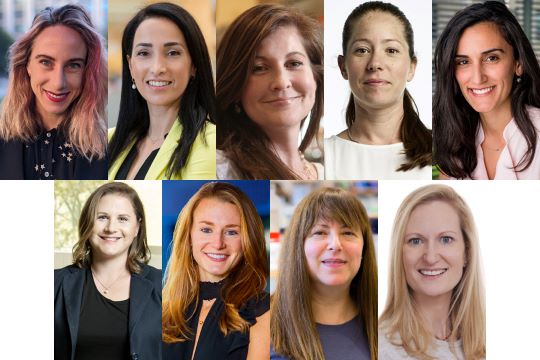
Despite increasing representation at MIT, female science and engineering faculty found biotech startups at a disproportionately low rate compared with their male colleagues, according to research led by the initiative’s founders, MIT Professor Sangeeta Bhatia, MIT Professor and President Emerita Susan Hockfield, and MIT Amgen Professor of Biology Emerita Nancy Hopkins. Read more.
Inside one designer’s career championing STEM for girls.
Janese Swanson is an American innovator and software developer who has advocated for girls’ education in STEM throughout her decades-long career. She codeveloped the first of the Carmen Sandiego educational games and is the founder of Girl Tech, a first-of-its-kind company that created products to spark young girls’ interest in technology. She spoke to Doreen Lorenzo for Designing Women, a series of interviews with brilliant women in the design industry. Read more.
Why equal representation in science is essential.
“Change has happened, but the glass ceiling is incredibly resistant in research and innovation,” says Alexandra Palt, executive vice president of the Fondation L’Oréal and creator of the For Women in Science Festival with UNESCO, which will celebrate the world’s leading, and most inspiring, female scientists on December 7. Read more.
5 things you didn't know about Marie Curie.
Here are some fun facts about this radiant woman who paved the path for other female scientists to follow: she didn't have a fancy lab, she was a World War I hero, Albert Einstein was a huge Marie Curie fan, and more. Read more.
Deepsea scientist honoured for mentoring of women in science.
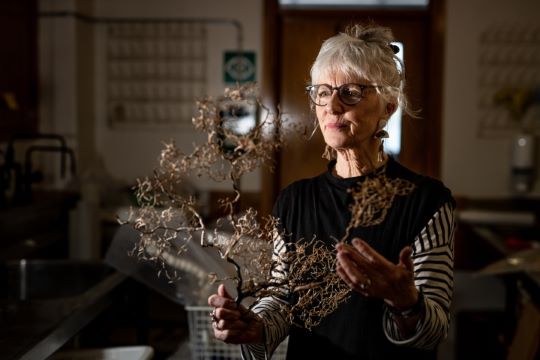
Di Tracey, a deep-sea fisheries and ecology scientist at NIWA, has been awarded the 2021 Miriam Dell Award by the Association for Women in the Sciences (AWIS) for her advocacy for and mentoring of women working in science. Photo by NIWA. Read more.
Women Invent and the power of media representation.
To celebrate 20 years of STEM with Silicon Republic, they highlight a very brief sample of just some of the amazing women they have profiled over the years across a range of disciplines from both Ireland and abroad. Read more.
Marianna Limas, Social Media Manager
Nilda Rivera, Partnership and Events Manager
|
|
|
Dear Colleagues,
I am pleased to include another issue of RFS Briefings with some timely and encouraging updates on women in science.
Of special interest, Google Doodle recently celebrated pioneering Indian biologist Kamal Ranadive.
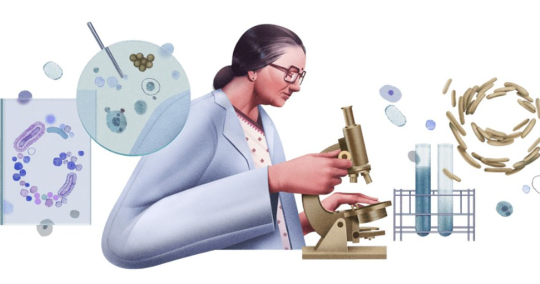
It was the 104th birthday of Kamal Ranadive, an Indian biomedical researcher known for her groundbreaking research on the connection cancers have with certain viruses. Her work researching cancer among women and children inspired female scientists in India to work on cancer research. Read more.
Please continue to share important news and opportunities with us so that we may share it with you, and others who are committed to supporting the careers of exceptional women in science.
Stay safe and sound,

Karla Shepard Rubinger
Executive Director
Rosalind Franklin Society
www.rosalindfranklinsociety.org

Susan Hockfield receives prestigious Charles L. Branch BrainHealth Award.
The Center for BrainHealth® brought together a who’s who of academic leaders, scientists and philanthropists to honor Dr. Susan Hockfield as the 10th recipient of the Dr. Charles L. Branch BrainHealth Award – the Center’s highest science honor. “No one is more deserving of this award than Susan Hockfield,” said Sandra Bond Chapman, PhD, Distinguished Professor and Chief Director of the Center for BrainHealth. “She has been a category breaker her entire career, promoting the convergence of interdisciplinary collaborations to maximize any single discovery. Welcome to the BrainHealth family!” You might be interested in Dr. Hockfield's RFS presentation from last fall. Read more.
Study casts doubt on theory that women aren't as competitive as men.
The theory has been touted as a possible explanation for America's longstanding gender wage gap. But new research by UArizona economist Mary L. Rigdon suggests women exhibit their competitiveness differently. Read more.
Senators launch bipartisan Women in STEM Caucus.
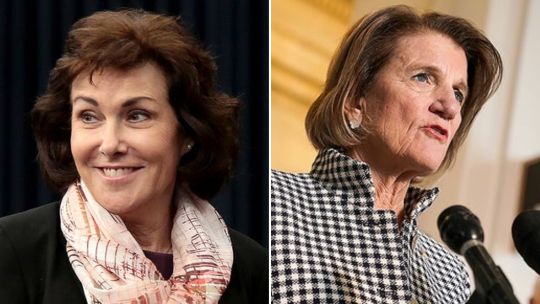
Sens. Jacky Rosen (D-Nev.) and Shelley Moore Capito (R-W.Va.) are launching a bipartisan caucus focused on creating more access and pathways for women and girls to participate in science, technology, engineering and math (STEM) careers. “We have to change the narrative for young girls, and maybe even for educators, because we want to have them be sure young girls see themselves doing these jobs and these jobs feel accessible,” Rosen told The Hill. Photos: © Greg Nash Read more.
The COVID pandemic has harmed researcher productivity – and mental health.
Surveys show that women, parents of young children and people of color are most affected by pandemic-related disruptions and need more support. Read more.
Promoting diversity and inclusion in STEMM starts at the top.
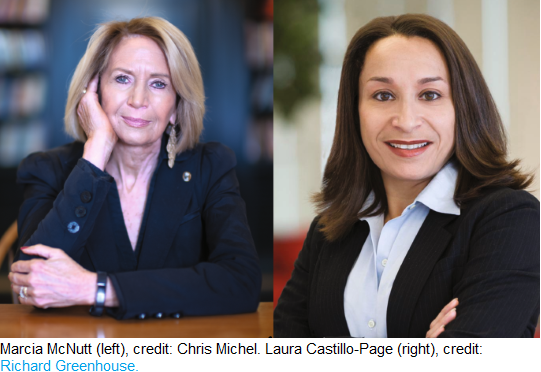
As leaders of one of the nation’s most preeminent scientific organizations, we have an obligation to enact change within the research community and within our own walls, and to ensure excellence, innovation and DEI in science. We can no longer simply say ‘we cannot find diverse talent’ or that the problem lies elsewhere. We must build our capacity, here at the top of the scientific enterprise, to lead DEI efforts and actively promote new approaches, practices and policies that bring about real results,” write Marcia McNutt and Laura Castillo-Page. Read more.
Vilcek-Gold Award for Humanism in Healthcare – 2022 Nomination Form.
The Vilcek Foundation and The Arnold P. Gold Foundation announced an open call for nominations for the 2022 Vilcek-Gold Award for Humanism in Healthcare. We are grateful that the Vilceks have been longtime supporters of RFS.The award shines a spotlight on immigrant leaders who have made an extraordinary contribution to humanism in healthcare in the United States. You may nominate any foreign-born person living and working in the United States whose work in healthcare exemplifies humanism and has created lasting and wide-spread change in U.S. healthcare. Read more.
Carrying forward Marie Curie's legacy in the 21st century.
As we reflect on Curie’s legacy and the progress that has been made, many actions are still needed to prevent and cure cancer as well as to advance the careers of women in science and medicine. Read more.
Lost Women of Science, Episode 2: The Matilda Effect.
A passionate outdoorswoman, a “rugged individualist” and a bit of an enigma—the few traces Dorothy Andersen left behind give us glimpses into who she was. In this episode, the Lost Women of Science podcast tracks down people determined to stitch together her life. Read more.
The Top 25 Women Leaders in Biotechnology of 2021.
The accomplished women selected for this year's awards have distinguished themselves through their professional achievements and contributions to their organizations. They represent a diverse range of positions, specialties, and backgrounds. Read more.
The Scientista Foundation is looking for new team members!
These positions are for anyone looking to get involved with a foundation which focuses on empowerment of those underrepresented in STEM. Read more.
Nancy Hopkins, pioneering biologist and advocate for gender equity in science, wins STAT Biomedical Innovation Award.
“It’s very easy to forget how much progress there has been because we haven’t arrived where we’d like to be. So we see the problems that still lie ahead. But you periodically have to pause and say, ‘Oh, my gosh, look how far we came,’” said Hopkins at the 2021 STAT Summit, where she was honored for her work. And she was a founding Board member of RFS. Read more.
L'Oréal USA announces 2021 For Women In Science Fellows.
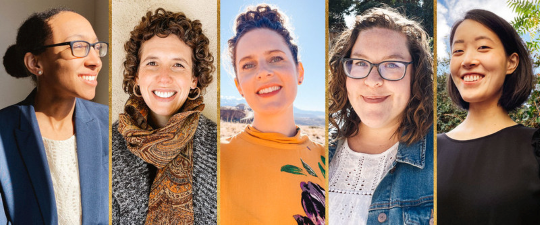
This year's Fellows conduct research in the areas of neurobiology, microbiology and biogeochemistry, physics, and materials chemistry. In addition to grant funding, Fellows receive mentorship, career coaching and recognition. Read more.
Legislation would create entrepreneurship center for women in STEM.
Female entrepreneurship is on the rise in Massachusetts, but it needs a boost. Rep. Alan Silvia said he hopes the Abigail Adams Entrepreneurial Act will create a center to provide funding and mentorship opportunities for women in science, technology, engineering and mathematics. Read more.
Scientists question Max Planck Society’s treatment of women leaders.
A group of 145 leading female scientists from across the world has signed an open letter to Germany’s Max Planck Society (MPS), expressing concern over “the highly publicized dismissals, demotions, and conflicts involving female directors of Max Planck Institutes”. Read more.
Action Collaborative on Preventing Sexual Harassment in Higher Education.
The Action Collaborative's Year 2 Annual Report summarizes the Action Collaborative's collective progress in the 2020-2021 year, identifies areas for future focus, discusses trends in organizations' reported areas of work, and highlights work shared by member organizations and partner network organizations. A complete collection of "descriptions of work" authored by member and partner network organizations is available in the repository. Read more.
Obituary: 'Unsung hero' of science laid the ground work for epic DNA discovery.
June Lindsey played a key role in the discovery of the DNA double helix, but she was never formally recognized for her work. Lindsey died in Ottawa earlier this month at the age of 99. Read more.
One of the billionaire scientists behind the Pfizer/BioNTech vaccine on what’s next.
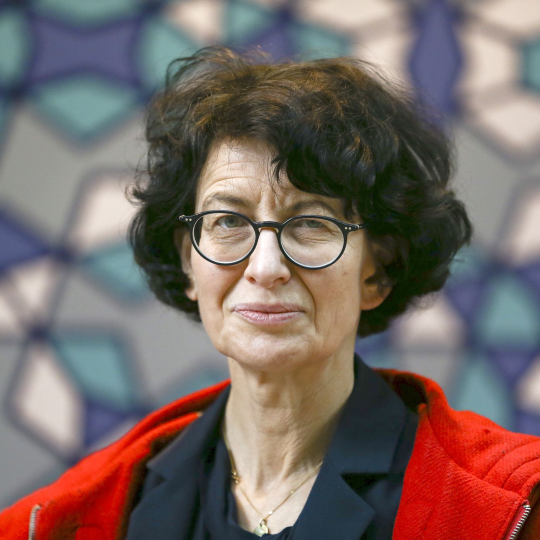
Turkish-German scientist Özlem Türeci, who founded BioNTech with her husband Uğur Şahin, was awarded the Order of Merit of the Federal Republic of Germany in March for work developing the BioNTech/Pfizer Covid-19 vaccine. Abdulhamid Hosbas/Anadolu Agency via Getty Images.Read more.
Buck Institute awarded $12.7 million from NIH to join SenNet, Cellular Senescence Network.
Buck Institute professors Judith Campisi, PhD and Birgit Schilling PhD, have been awarded a $12 million grant from the NIH’s Common Fund to join the newly established Cellular Senescence Network (SenNet), a national “tissue and cell mapping” effort involving 13 research institutes. Read more.
Marianna Limas, Social Media Manager
Nilda Rivera, Partnership and Events Manager
|
|
Dear Colleagues,
I am pleased to include another issue of RFS Briefings with some timely and encouraging updates on women in science.
The Pearl Meister Greengard Prize, an international award recognizing outstanding women in biomedical research awarded annually by The Rockefeller University, was presented on September 30 by Mary Schmidt Campbell, President of the Spelman College, to the 2021 recipient Pamela J. Björkman, David Baltimore Professor of Biology and Bioengineering at the California Institute of Technology. Read more.
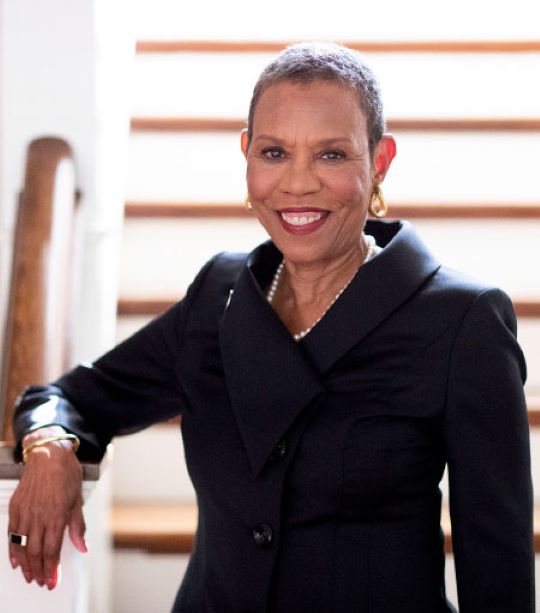 Mary Schmidt Campbell, Spelman’s 10th president. Image: Spelman College Mary Schmidt Campbell, Spelman’s 10th president. Image: Spelman College
Please continue to share important news and opportunities with us so that we may share it with you, and others who are committed to supporting the careers of exceptional women in science.
Stay safe and sound,

Karla Shepard Rubinger
Executive Director
Rosalind Franklin Society
www.rosalindfranklinsociety.org

She is breaking glass ceilings in space, but facing sexism on Earth.
Col. Wang Yaping is set in the coming weeks to be the first Chinese woman to walk in space as China’s space station glides around Earth at 17,100 miles per hour. And yet, as she began a six-month mission last week at the core of China’s ambitious space program, official and news media attention fixated as much on the comparative physiology of men and women, menstruation cycles, and the 5-year-old daughter she has left behind, as they did on her accomplishments. Steven Lee Myers reports for The New York Times.Read more.
At MIT, Nobel laureate Frances Arnold describes innovation by evolution.
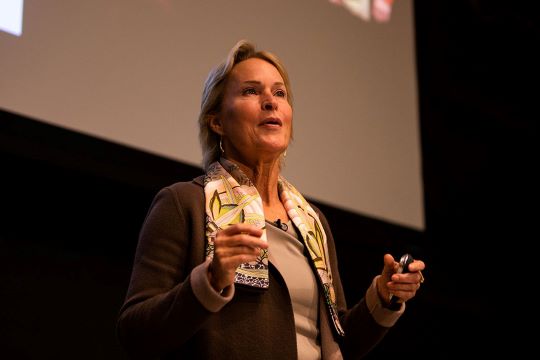 Frances Arnold. Photo: Jake Belcher Frances Arnold. Photo: Jake Belcher
“As engineers, we want to create things that don’t necessarily exist on the planet, or may have never existed, but that solve real problems,” said Frances H. Arnold at the 2021 Hoyt C. Hottel Lecture in Chemical Engineering on Oct. 1. Read more.
Women’s professional STEM societies rethink gender diversity.
Scientific understanding is evolving to recognize that both biological sex and the cultural construct of gender lie on a continuum. And robust evidence supports the notion that racial, gender, and cultural diversity leads to better science. But who should take on the mantle of champion for people who aren’t represented by traditional academic and professional organizations? Read more.
Louise Slade, scientist who studied the molecules in food, dies at 74.
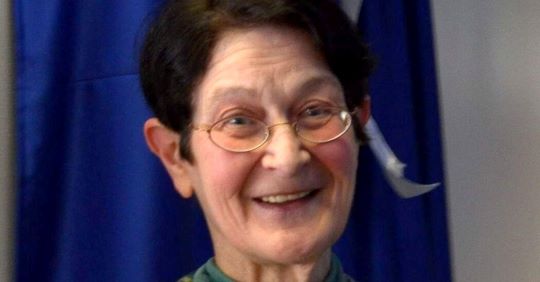
Louise Slade, a groundbreaking food scientist whose work you can thank for soft-from-the-freezer ice cream, extra-chewy cookies and potato chips that retain their satisfying crunch despite being baked and not fried, died on October 7 in Morristown, N.J. She was 74, The New York Times reports. Read more.
They look for the women who are changing the world through science.
Despite the increase in the number of women enrolled in scientific careers in recent decades, the global number of female researchers in the field of science is still very small. 3M seeks to motivate and inspire more girls and women to perform in STEM disciplines. For that reason, it launches its call for the second edition of 25 Women in Science Latin America 2022. Read more.
Muriel Lezak, leading authority on brain injuries, dies at 94.
Muriel Lezak, a neuropsychologist who wrote a landmark textbook in the early days of her discipline that became an essential guide to the description and evaluation of brain injuries and disorders, died on October 6 in a memory care facility in Portland, Ore. Read more.
Heels: A New Account of the Double Helix.
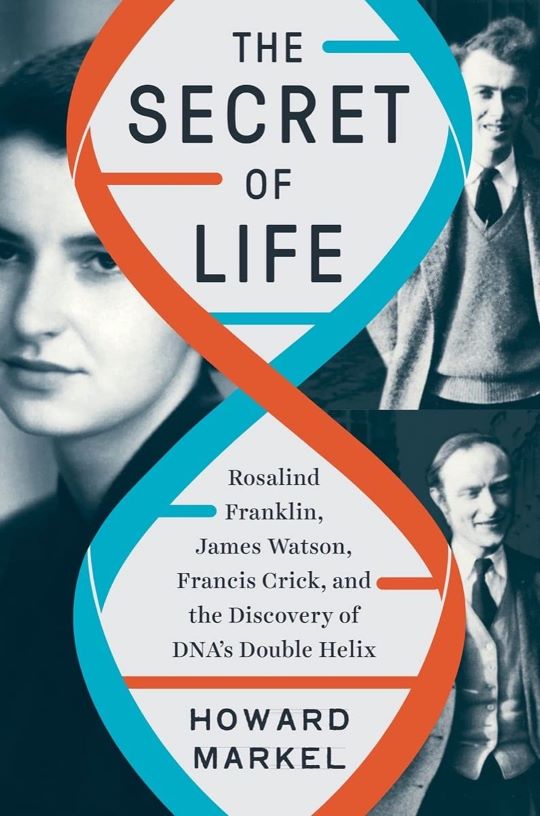
Nathaniel Comfort, professor of History of Medicine at Johns Hopkins University, reviews the book The Secret of Life: Rosalind Franklin, James Watson, Francis Crick, and the Discovery of DNA’s Double Helix by Howard Markel. “ Essentially all of the men around her, Markel argues, colluded to short-circuit her career, drive her out of the double helix race, and deny her credit for the discovery. Markel’s argument fails for a peculiar reason: not because he misstates Franklin’s treatment (although at times he does), but because for all his gallantry, Franklin remains overshadowed. The world he creates on the page is just as simplistic and male-dominated as the one he seeks to replace.” Read more.
Lost Women of Science launches podcast series to promote the remarkable women of science you've never heard of.
Journalist and author Katie Hafner, and bioethicist Amy Scharf, announced the launch of the Lost Women of Science podcast series. The first season will include four in-depth episodes centered on Dr. Dorothy Andersen (1901-1963), a pediatric pathologist who identified and named cystic fibrosis in 1938. Read more.
National awards and female emergency physicians in the United States: Is the "recognition gap" closing?
The gender gap in emergency medicine awards has narrowed in the last 20 years but still exists. This discrepancy is an example of how bias can compound over time to generate gaps in recognition, career advancement, and promotion. The pipeline to award nominations should be addressed at the individual, departmental, awards committee, and organizational levels. Read more.
$10 million announced to support algae-feed research for U.S. dairy.
A new $10 million grant will bolster research into algae-based feed supplements that could increase environmental sustainability in the dairy industry while improving milk production. The five-year grant from USDA Sustainable Agriculture Systems Program will support a research team, led by Nichole Price with Bigelow Laboratory for Ocean Sciences and Colby College, as it tests algal feed additives and assess the product’s impact on animals, farms, communities, and the planet. Read more.
Pamela McCorduck, historian of artificial intelligence, dies at 80.
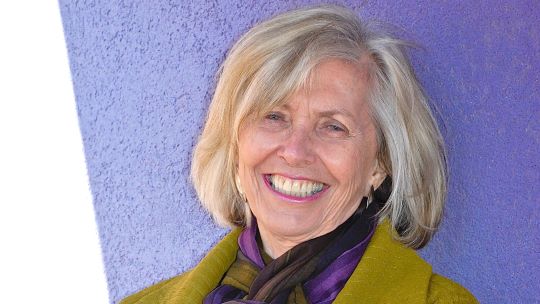
Pamela McCorduck, whose encounters with eminent computer scientists in the 1960s and ’70s led her to write a groundbreaking history of artificial intelligence over the field’s first 20 years, died on October 18 at her home in Walnut Creek, California. She was 80, The New York Times reports. Credit: Jill Fineberg Photography. Read more.
COP26: Why are women still missing at the top climate table.
In a speech to The Energy Law Institute’s Annual Clifford Chance Lecture in October 2021, Emma Howard Boyd CBE, Chair of the Environment Agency said, “Women have to shout louder than men to be heard. Women have held just 28% of the share of voice in news articles about climate change.” Read more.
Marianna Limas, Social Media Manager
Nilda Rivera, Partnership and Events Manager
|
|
Dear Colleagues,
I am pleased to include another issue of RFS Briefings with some timely and encouraging updates on women in science.
GEN, Genetic Engineering & Biotechnology News, is celebrating an exciting anniversary this month; 40 years of bringing complete coverage of the biotech industry to its audience! In the October issue, they reflect upon the past and look at the potential future of the biotech industry. Publisher and CEO Mary Ann Liebert is pictured here with her issue. This depth of experience and leadership has also been central to her role as founder of the Rosalind Franklin Society. We benefit from this legacy and leadership every day!
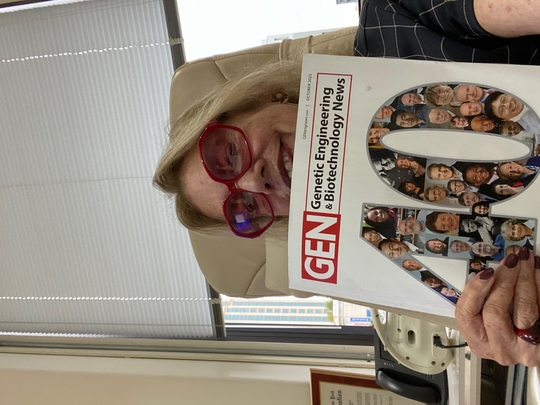
Please continue to share important news and opportunities with us so that we may share it with you, and others who are committed to supporting the careers of exceptional women in science.
Stay safe and sound,

Karla Shepard Rubinger
Executive Director
Rosalind Franklin Society
www.rosalindfranklinsociety.org

Myriam Sarachik, physicist who plumbed magnetism, dies at 88.
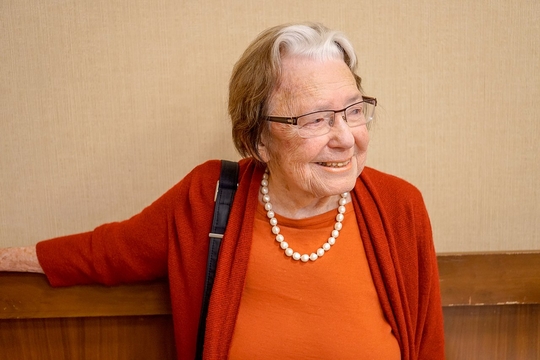
Myriam P. Sarachik, a scientist whose groundbreaking experiments illuminated subtle but fundamental physics in the electronic and magnetic behavior of materials, died on Oct. 7 in Manhattan, The New York Times reports. “In the 1960s, Dr. Sarachik entered and succeeded in a field, experimental physics, where women were a rarity. Even her mentors insisted that she might really have preferred being a housewife or a part-time teacher. But she persisted, becoming a professor in 1964 at the City College of New York.” Read more. (Image by Wikipedia)
2021 Women Advancing Thyroid Research Award.
RFS celebrates the recipients of the 2021 Women Advancing Thyroid Research Award! Congratulations Giulia Lanzolla, MD and Victoria Casado-Medrano, PhD! Read the full press release that includes their oral abstracts.
Nobel Prize winner Dr. Jennifer A. Doudna to receive top award from the Women in Medicine Legacy Foundation.
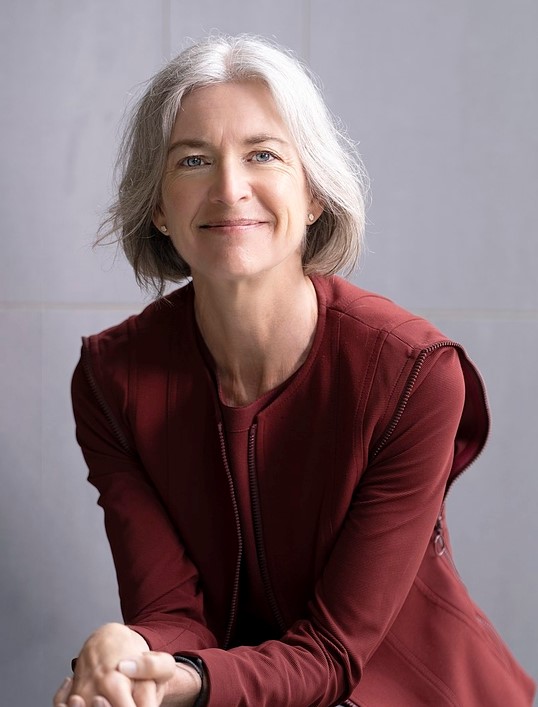
“The New York Academy of Medicine is proud to partner with the Women in Medicine Legacy Foundation to honor Dr. Jennifer Doudna for her groundbreaking contributions to science and medicine through genome engineering, which has already shown enormous potential to improve disease treatment and health worldwide,” said Judith A. Salerno, MD, MS, NYAM President. “Through this partnership, we also celebrate and build upon the historical contributions of generations of women in medicine.” Read more. (Jennifer Doudna in 2021 by Christopher Michel via Wikipedia). Dr. Doudna was also a featured speaker last year for our GEN/RFS Women in Science Series. You can access the presentation here.
Dr. Risa Lavizzo-Mourey wins Gustav O. Lienhard Award for Advancement of Health Care from National Academy of Medicine.
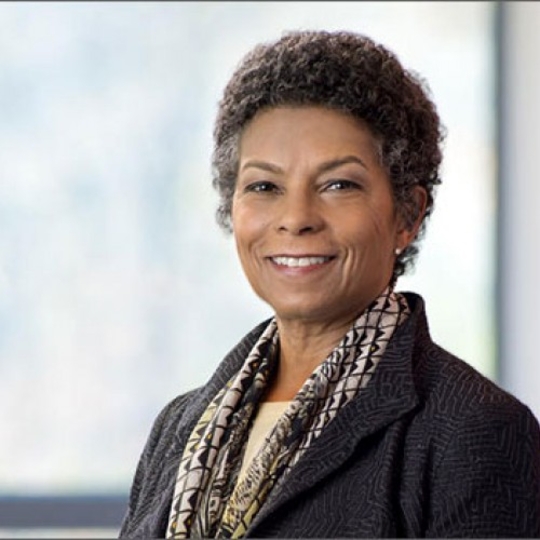
“Dr. Lavizzo-Mourey’s pioneering work has truly shifted the paradigm of health and health care access in the US, as she recognized that creating a healthier society requires looking upstream, beyond the traditional scope of medical care, to address social and economic factors influencing health,” said NAM President Victor J. Dzau in a press release. Read more. (Image by Penn LDI)
Apply for the new BII & Science prize for innovation today.
Behind every life-changing solution is an entrepreneurial scientist. A creative mind who proved an idea in the lab and dared to carry it out in the world. To encourage more scientists to translate their research, BioInnovation Institute (BII) & Science present a new annual award. Three winners will have their essays published in Science magazine and will be invited into BII’s entrepreneurial ecosystem. In addition, the Grand Prize winner will receive a prize of USD 25,000 and each runner-up will receive USD 10,000 at a grand award show celebration in Copenhagen, Denmark. Read more.
One reason men often sweep the Nobels: few women nominees.
Even after the recent increases, just 13% of the nominees for the physiology or medicine prize and 7% to 8% for the chemistry prize are women. “This has been the problem with many high-level and prestigious awards: If [women are] not in the pool, you can’t select them,” says Jo Handelsman, a molecular biologist at the University of Wisconsin, Madison, who has studied gender bias in the scientific community. Read more.
Call for nominations: Use of race, ethnicity, and ancestry as population descriptors in genomics research.
An anticipated ad hoc committee under the auspices of the National Academies of Sciences, Engineering, and Medicine’s Health and Medicine Division will convene to review and assess the existing methodologies, benefits, and challenges in the use of race and ethnicity and other population descriptors in genomics research. The committee will produce a report that will describe best practices on the use of race, ethnicity, and genetic ancestry and other population descriptors in genetics and genomics research, as formulated by the committee. Read more.
Documentary short, “The Uprising,” showcases women in science who pressed for equal rights at MIT in the 1990s.
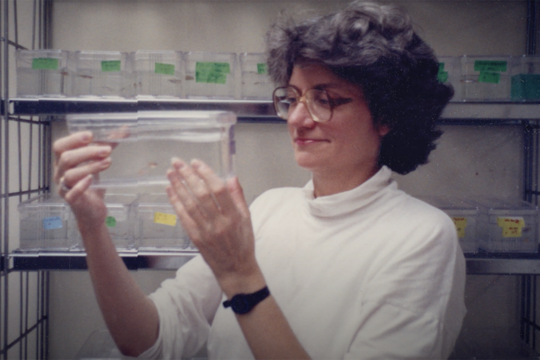
The MIT Press announced the digital release of “The Uprising,” a documentary short about the unprecedented behind-the-scenes effort that amassed irrefutable evidence of differential treatment of men and women on the MIT faculty in the 1990s.This photo shows the young Nancy Hopkins, who was critical in this report to document the significant disparities for women in science. Professor Hopkins was one of the RFS founding Board Members, still very much supporting these efforts today. Read more.
Women and Global South underrepresented in climate science.
A newly published study by Carbon Brief analysed 100 of the most cited research papers on climate over the last five years and has revealed glaring inequalities related to gender and countries of affiliation of academic authors, Amy Nguyen reports. Read more.
Nadia Chaudhri, scientist with an end-of-life mission, dies at 43.
Nadia Chaudhri was a neuroscientist at Concordia University in Montreal who chronicled her terminal ovarian cancer on Twitter and raised money for minority students. “I’ve been so moved by your story, Nadia, and your kindness and spirit are just something I don’t think I’ve ever seen in such abundance before,” one Twitter user wrote. “I will carry you in my heart for as long as I live.” Read more.
UVA biomedical engineer receives NIH Director’s Early Independence Award.
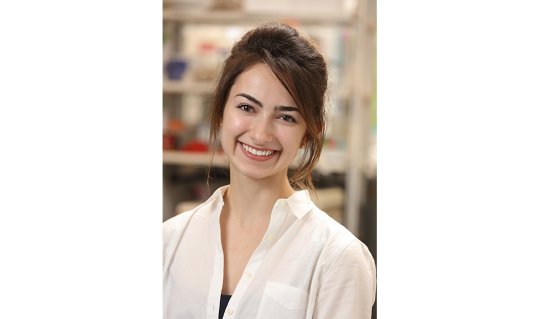
The National Institutes of Health announced that Natasha Sheybani, assistant professor in the University of Virginia School of Engineering and Applied Science’s Department of Biomedical Engineering, is the recipient of the prestigious NIH Director’s Early Independence Award. Read more.
Elisa Konofagou elected to the National Academy of Medicine.
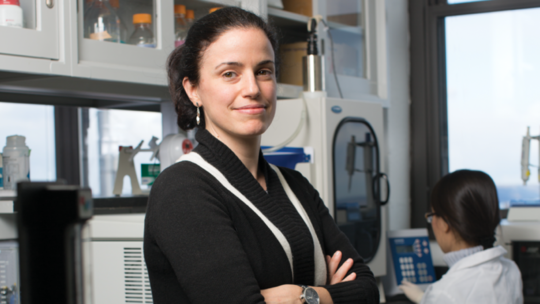
Elisa Konofagou, Robert and Margaret Hariri Professor of Biomedical Engineering and Professor of Radiology. Photo credit: Eileen Barroso.
Elisa Konofagou, the Robert and Margaret Hariri Professor of Biomedical Engineering and Professor of Radiology at Columbia University, has been elected a member of the National Academy of Medicine (NAM), one of the highest honors in the fields of health and medicine. Read more.
New report finds wide pay disparities for physicians by gender, race, and ethnicity.
With rare exceptions, White male physicians and scientists are paid significantly more than women of all races and men of color, even after accounting for rank, specialty, and degree, according to the first-ever, national-level analysis of full-time faculty salaries in academic medicine by gender, race, and ethnicity. Read more.
National Academy of Medicine announces creation of David and Beatrix Hamburg Award for Advances in Biomedical Research and Clinical Medicine.
The award will honor an exceptional biomedical research discovery, translation, or public health intervention by one or more scientists that has fundamentally enriched the understanding of biology and disease, leading to a significant improvement in human health and social well-being and reduction in global health inequities, according to a press release. Read more.
Statements by Officials of the U.S. Department of Health and Human Services Commemorating the First Openly Transgender Four-Star Officer and First Female Four-Star Admiral of the U.S. Public Health Service Commissioned Corps on October 19, 2021.
The U.S. Department of Health and Human Services (HHS) publicly announced today the nation’s first openly transgender four-star officer across any of the eight uniformed services of the United States. Admiral Rachel Levine was ceremonially sworn in as a four-star admiral. Read more.
“Science and Technology Now Sit in the Center of Every Policy and Social Issue”
Alondra Nelson, the White House Office of Science and Technology Policy’s first deputy director for science and society, wants to make innovation more inclusive and equitable, and use social science to improve policymaking. Read more.
Advancing Equity in Science & Technology Ideation Challenge: Submit Your Ideas Today.
On October 20, 2021, White House Office of Science and Technology Policy (OSTP) announced “The Time is Now: Advancing Equity in Science and Technology Ideation Challenge.” OSTP Director Eric Lander is asking the American public to share their insights on a central question, “How can we guarantee all Americans can fully participate in, and contribute to, science and technology?” Submissions are being accepted through November 19, 2021. Read more.
Marianna Limas, Social Media Manager
Nilda Rivera, Partnership and Events Manager
|
|
Dear Colleagues,
I am pleased to include another issue of RFS Briefings with some timely and encouraging updates on women in science.
Of great importance, Francis S. Collins, M.D., Ph.D., recently announced his decision to end his tenure as the director of the National Institutes of Health by the end of the year. Dr. Collins is the longest serving presidentially appointed NIH director, having served three U.S. presidents over more than 12 years. He supported our work at RFS and was a giant among women in science.
Here is the presentation by Dr. Collins at the RFS board meeting, including his solo with his guitar actually named Rosalind after Rosalind Franklin!
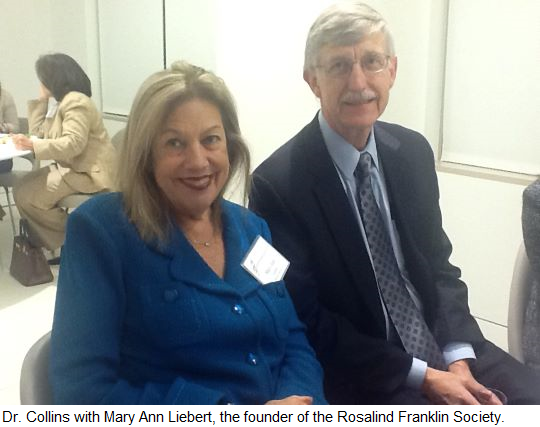
Please continue to share important news and opportunities with us so that we may share it with you, and others who are committed to supporting the careers of exceptional women in science.
Stay safe and sound,

Karla Shepard Rubinger
Executive Director
Rosalind Franklin Society
www.rosalindfranklinsociety.org

Katalin Karikó named the 2022 recipient of the Pearl Meister Greengard Prize.
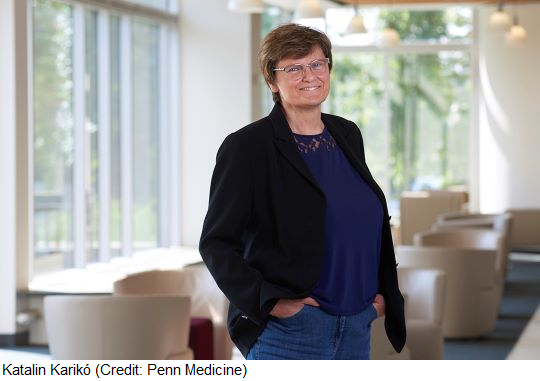
The Rockefeller University announced that Dr. Katalin Karikó will receive the 2022 Pearl Meister Greengard Prize: An International Award Recognizing Outstanding Women in Biomedical Research. Dr. Karikó's discovery of how to keep synthetic RNA from activating the innate immune system has paved the way for RNA vaccines. The prize will be awarded to Dr. Karikó in a ceremony at Rockefeller next year. Read more. In case you missed it, check out the The Women in Science Webinar: Development of the mRNA Therapeutic- Not Warp Speed!
2022 Rosalind Franklin Young Investigator award recipients announced.
The Genetics Society of America (GSA) and The Gruber Foundation announced that the 2022 recipients of the Rosalind Franklin Young Investigator Award are Aude Bernheim, PhD, of INSERM; Kara McKinley, PhD, of Harvard University; and Viviane Slon, PhD, of Tel Aviv University. Read more.
Meet the first two black women to be inducted into the National Inventors Hall Of Fame.
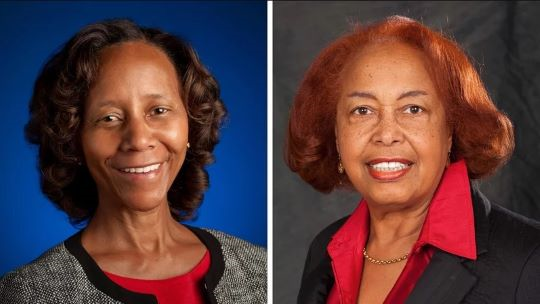
The National Inventors Hall of Fame has been around for nearly five decades but hasn't included any Black women in its ranks — until now. Engineer Marian Croak and the late ophthalmologist Patricia Bath will make history as part of the next cohort of inductees, the nonprofit announced this past week, Rachel Treisman reports for NPR. Read more.
How these founders are detoxifying the denim industry -- and saving the planet.
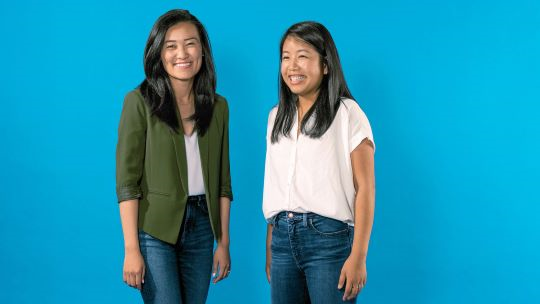
Michelle Zhu and Tammy Hsu run Huue, a startup developing sustainable textile dyes to replace the ecologically destructive colorants the fashion industry uses. “We look at how the indigo plant makes the indigo dye molecule. Then we take that genetic information and instruct our microbes to make indigo the same way. We're growing these microbes, and they're programmed to secrete the indigo,” says Hsu. Photograph By Kelsey McClellan via Inc. Read more.
Feeling passionate about math.
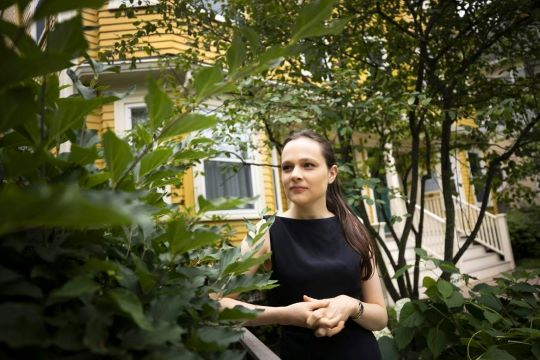 Morgane Austern. Photo by Stephanie Mitchell/Harvard Staff Photographer. Morgane Austern. Photo by Stephanie Mitchell/Harvard Staff Photographer.
To Morgane Austern, math is beautiful. Austern, who joined Harvard as an assistant professor in the Department of Statistics in July, brings a creative touch to her work in probability and statistics, drawing from her experience in theater. Born in Switzerland and educated in France, Austern also has a passion for volunteering in STEM education. She spoke to the Harvard Gazette about her love of math and how she plans to continue her volunteer work. Read more.
Black female biologist tests, entertains and explains science on TV, social media.
Raven Baxter, a.k.a. “Raven the Science Maven,” spoke with Dawn Fallik from the Washington Post about the ways she uses social media to bring science to a new audience, her surprise at being a scientific role model, and how she sees her ADHD diagnosis as a scientific and creative advantage. Read more.
A conversation with Jennifer Doudna, PhD, developer of CRISPR gene-editing technology.
On Nov. 8, Doudna will discuss her career path, the development of CRISPR, and her perspective on how to attract more women and people from underrepresented groups to science and biomedical research at the AAMC’s annual meeting, Learn Serve Lead 2021: The Virtual Experience. In an interview for AAMC, she discusses the potential of gene editing, the importance of diversity in science, and how the pandemic has changed labs. Read more.
The National Academies of Sciences, Engineering, and Medicine will appoint an interdisciplinary committee to review the literature on bias and systemic racism in STEM workplaces. Submit nominations by October 20, 2021. Read more.
New Space is proud to recognize World Space Week – dedicated this year to honoring the contributions of women to the space sector. Read more.
A new book titled "The Secret of Life" paints a troubling picture of how the discovery of DNA’s double helix came about, and why scientist Rosalind Franklin deserved credit. Read more.
Congratulations to Dr. Katja Schenke-Layland (co-EIC of Tissue Engineering, Reviews), for receiving the GSCN 2021 Hilde Mangold Award. She received the award for her significant research on the translation of findings from early human development into applications for regenerative medicine with a special focus on the extracellular matrix. Read more.
Marianna Limas, Social Media Manager
Nilda Rivera, Partnership and Events Manager
|
|
|